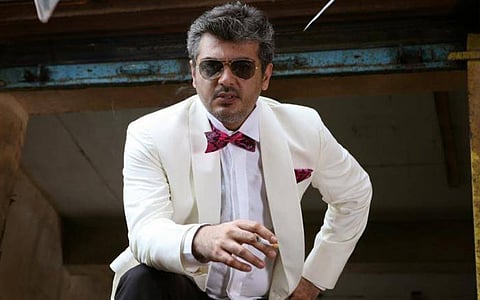
- Reviews
- Power List 2024
- Cannes 2024
- In-Depth Stories
- Web Stories
- News
- FC Lists
- Interviews
- Features
- FC SpecialsFC Specials

Mankatha, Ajith Kumar's 50th film, ushered in a new era in Tamil cinema. 2011, the year in which the movie hit theatres, seems almost like a century ago now. And since we're picking our pieces up every day during the pandemic, the concept of time is going through a period of change. Our idea of a decade has stretched longer than the regular number of years it takes to reach there.
This brings us to the ultimate question—how did Mankatha change the way we consume Tamil movies? For starters, the crime thriller, directed by Venkat Prabhu, starred an actor who didn't shy away from sporting a salt-and-pepper look. This actor that we're talking about is a person whose posters are bathed in milk. It shows the amount of devotion his fans shower upon him. And this particular phenomenon is reserved only for a few A-listers; the religious fervor isn't extended to all the actors.
In an industry where male stars regularly refuse to play roles that are more suitable for their age, Ajith walks in the other direction with nothing but sheer grit. In movies like Muthu (1995) and Arunachalam (1997), Rajinikanth gambled with the salt-and-pepper look, but he mostly did that to unleash two distinct identities, as he was portraying two different characters (the father and the son). And the characters that had greys in their hair appeared only in the flashback episodes — typical do-gooders who cared dearly about the well-being of the poor people. Perhaps, the aura of world-weariness that surrounds them may have dictated their get-ups.
And in Indian (1996), the silvery mane, that sits neatly on the head of Senathipathy (Kamal Haasan), indicates his autumn years. Aarilirunthu Arubathu Varai (1979) and Nayakan (1987), featuring Rajinikanth and Haasan in the lead, respectively, are also exceptions, as their characters gradually grow old in those movies.
Though all the films that I have mentioned till this point are mainstream offerings, only Ajith has played his actual age. One can say that his role in Mankatha was that of an anti-hero's and not somebody who was willing to sacrifice his life. But that's another line of discussion because leading stars in Indian cinema do not wish to take on villainous roles easily. They're afraid that it might affect their image. And their mighty fans also wouldn't prefer to see their favorite demi-gods in films that project them as evil and cunning.
After Mankatha, however, Ajith has also not gone down that path. It is, by all accounts, a one-off experiment that has paid rich dividends. But, today, can you imagine Kabali (2016) and Kaala (2018), without Rajinikanth's grey hair? You cannot! And that's what Mankatha has achieved. It may, sometimes, sound silly to say that it took only one movie to set the trend, but there's just no other way of putting it.
While the romantic angle in Mankatha turns out to be a façade of false promises, the one in Veeram (2014) sticks to the bone. The latter isn't a romantic drama. It's not an Alaipayuthey (2000), or a Vinnaithaandi Varuvaayaa (2010); it's supremely underlined by the marker of action and punch-lines, but Ajith doesn't dye his hair black in order to be readily accepted by the general public as a mass hero. And, now, it has become his trademark style.
The other big stars from Tamil cinema, such as Vijay, Suriya, and Dhanush have adopted a similar path over the years – but not to the extent of Ajith, though. In the yet-to-release spy movie Dhruva Natchathiram, Vikram is seen with a thick beard (with greyish streaks in them). In the West, George Clooney famously Pied Piper-ed his way through the ranks of Hollywood by not giving two hoots about his aging looks. And he casually featured in rom-coms without feeling the need to appear younger.
There's still a long road to go, but it's a start nevertheless. And, fortunately, the battle doesn't end here. The heroes seem to be doing okay. They are trying out brand new things with regard to their roles and hairstyles, but what's happening with our female stars? Why aren't women who are in their forties and fifties given the same platform?
When Ajith, Vikram, and Rajinikanth are routinely cast alongside Kajal Aggarwal, Tamannaah, and Nayanthara, why can't the likes of Revathi, Tabu, Ramya Krishnan, Urvashi, and Simran enjoy the same as their male counterparts? That's a rough conversation that needs to be dug out of the cornerstones of patriarchy. And we shall get there soon.
For now, it's time to Vilayadu Mankatha.